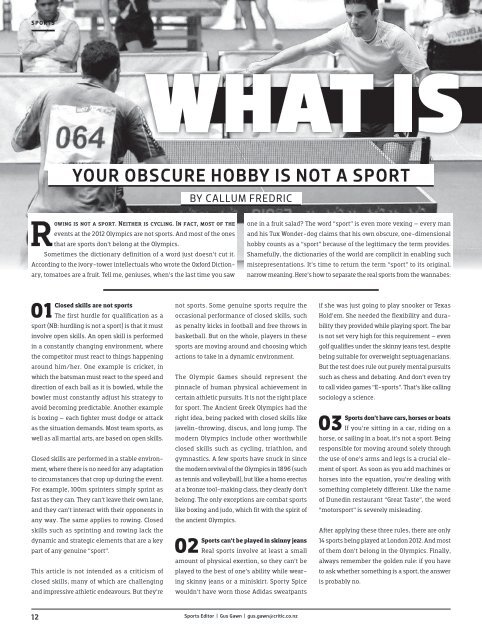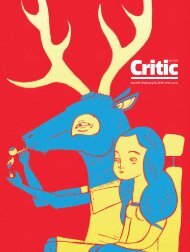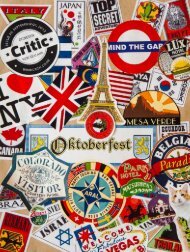Create successful ePaper yourself
Turn your PDF publications into a flip-book with our unique Google optimized e-Paper software.
sPorts<br />
Rowing is <strong>not</strong> a sport. Neither is cycling. In fact, most of the<br />
events at the 2012 Olympics are <strong>not</strong> sports. And most of the ones<br />
that are sports don’t belong at the Olympics.<br />
Sometimes the dictionary definition of a word just doesn’t cut it.<br />
According to the ivory-tower intellectuals who wrote the Oxford Dictionary,<br />
tomatoes are a fruit. Tell me, geniuses, when’s the last time you saw<br />
01<br />
Closed skills are <strong>not</strong> sports<br />
The first hurdle for qualification as a<br />
sport (NB: hurdling is <strong>not</strong> a sport) is that it must<br />
involve open skills. An open skill is performed<br />
in a constantly changing environment, where<br />
the competitor must react to things happening<br />
around him/her. One example is cricket, in<br />
which the batsman must react to the speed and<br />
direction of each ball as it is bowled, while the<br />
bowler must constantly adjust his strategy to<br />
avoid becoming predictable. A<strong>not</strong>her example<br />
is boxing – each fighter must dodge or attack<br />
as the situation demands. Most team sports, as<br />
well as all martial arts, are based on open skills.<br />
Closed skills are performed in a stable environment,<br />
where there is no need for any adaptation<br />
to circumstances that crop up during the event.<br />
For example, 100m sprinters simply sprint as<br />
fast as they can. They can’t leave their own lane,<br />
and they can’t interact with their opponents in<br />
any way. The same applies to rowing. Closed<br />
skills such as sprinting and rowing lack the<br />
dynamic and strategic elements that are a key<br />
part of any genuine “sport”.<br />
This article is <strong>not</strong> intended as a criticism of<br />
closed skills, many of which are challenging<br />
and impressive athletic endeavours. But they’re<br />
12<br />
What iS<br />
yoUR oBscURe HoBBy Is <strong>not</strong> A sPoRt<br />
<strong>not</strong> sports. Some genuine sports require the<br />
occasional performance of closed skills, such<br />
as penalty kicks in football and free throws in<br />
basketball. But on the whole, players in these<br />
sports are moving around and choosing which<br />
actions to take in a dynamic environment.<br />
The Olympic Games should represent the<br />
pinnacle of human physical achievement in<br />
certain athletic pursuits. It is <strong>not</strong> the right place<br />
for sport. The Ancient Greek Olympics had the<br />
right idea, being packed with closed skills like<br />
javelin-throwing, discus, and long jump. The<br />
modern Olympics include other worthwhile<br />
closed skills such as cycling, triathlon, and<br />
gymnastics. A few sports have snuck in since<br />
the modern revival of the Olympics in 1896 (such<br />
as tennis and volleyball), but like a homo erectus<br />
at a bronze tool-making class, they clearly don’t<br />
belong. The only exceptions are combat sports<br />
like boxing and judo, which fit with the spirit of<br />
the ancient Olympics.<br />
02<br />
By callum FreDric<br />
Sports can’t be played in skinny jeans<br />
Real sports involve at least a small<br />
amount of physical exertion, so they can’t be<br />
played to the best of one’s ability while wearing<br />
skinny jeans or a miniskirt. Sporty Spice<br />
wouldn’t have worn those Adidas sweatpants<br />
sports editor | gus gawn | gus.gawn@critic.co.nz<br />
one in a fruit salad? The word “sport” is even more vexing – every man<br />
and his Tux Wonder-dog claims that his own obscure, one-dimensional<br />
hobby counts as a “sport” because of the legitimacy the term provides.<br />
Shamefully, the dictionaries of the world are complicit in enabling such<br />
misrepresentations. It’s time to return the term “sport” to its original,<br />
narrow meaning. Here’s how to separate the real sports from the wannabes:<br />
if she was just going to play snooker or Texas<br />
Hold’em. She needed the flexibility and durability<br />
they provided while playing sport. The bar<br />
is <strong>not</strong> set very high for this requirement – even<br />
golf qualifies under the skinny jeans test, despite<br />
being suitable for overweight septuagenarians.<br />
But the test does rule out purely mental pursuits<br />
such as chess and debating. And don’t even try<br />
to call video games “E-sports”. That’s like calling<br />
sociology a science.<br />
03<br />
Sports don’t have cars, horses or boats<br />
If you’re sitting in a car, riding on a<br />
horse, or sailing in a boat, it’s <strong>not</strong> a sport. Being<br />
responsible for moving around solely through<br />
the use of one’s arms and legs is a crucial element<br />
of sport. As soon as you add machines or<br />
horses into the equation, you’re dealing with<br />
something completely different. Like the name<br />
of Dunedin restaurant “Great Taste”, the word<br />
“motorsport” is severely misleading.<br />
After applying these three rules, there are only<br />
14 sports being played at London 2012. And most<br />
of them don’t belong in the Olympics. Finally,<br />
always remember the golden rule: if you have<br />
to ask whether something is a sport, the answer<br />
is probably no.














